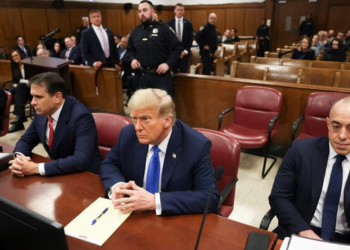
Senators were rushing to finalize a deal to stiffen border security Sunday evening ahead of what is shaping up as the most momentous week in immigration policy in Washington in nearly four decades.
Those negotiating the deal promised it would be transformative, not only solving the migrant crisis that has embarrassed President Biden but also setting a new higher bar for illegal immigrants hoping to gain entry at the southern border for years to come.
Senators hope to vote on the deal this week.
Across the Capitol, meanwhile, House Republicans plan to make history this week by impeaching a sitting Cabinet secretary for the first time in history.
They have scheduled a vote on two articles of impeachment accusing Homeland Security Secretary Alejandro Mayorkas of defying immigration enforcement laws and lying to Congress about his management of the border.
As dramatic as Washington’s policy battle is, an even bigger drama is playing out in Eagle Pass, Texas, where state National Guard troops are occupying a local park that the Border Patrol had been using to facilitate its catch-and-release practice.
SEE ALSO: House Speaker Mike Johnson rejects idea that Trump killed border deal: ‘I am calling the shots’
Gov. Greg Abbott hosted more than a dozen governors in Eagle Pass, where he blamed the president for what they are facing.
Those governors have poured their own guard troops into Texas to assist, saying he’s the speartip of the most important fight going on in the country right now.
Mr. Abbott said that the local park where the governors gathered saw 3,000 or more people crossing there a few weeks ago. In recent days, he said, the park is seeing just three people a day.
He said if Texas can do that, it shows Mr. Biden could do it too, without needing new legislation from Congress, a claim the president has made when asked how he’s handling the border crisis.
Texas will also go before a panel of judges this week arguing for the state’s power to defend its borders with more than 100 miles of razor wire fencing along the Rio Grande.
“The state of Texas can do what the federal government is charged to do and has the tools to do,” Mr. Abbott said. “Joe Biden, it is your turn now.”
SEE ALSO: Lindsey Graham praises bipartisan border deal despite fury from Trump, House Republicans
Mr. Biden has resisted that notion, instead counting on senators to deliver a bipartisan answer he can sign onto, hoping that will erase the public’s fury at three years of unprecedented chaos along the U.S.-Mexico boundary.
Those bipartisan negotiations have been going on for four months, and Senate Majority Leader Charles E. Schumer, New York Democrat, promised last week that the final deal would be published by Sunday night, in anticipation of a first test vote as early as Wednesday.
Negotiators dribbled out more details of the emerging deal on Sunday, saying it will end catch-and-release, the main driver of the crisis. People believe if they show up they will be allowed into the country in the hope they return for deportation proceedings years in the future.
They spend those years burrowing into communities with previous illegal immigrants, making it nearly impossible to oust them later.
Negotiators said they end catch-and-release for those entering between official border crossings by expanding the government’s capacity to detain more illegal immigrant adults, which means their cases can be heard within weeks and they can be ousted if they don’t qualify for asylum or another form of protection.
For families, the negotiators signaled they would still be released, but would be subject to some sort of short-term monitoring, with the hope that their cases can be scheduled quickly and they can be ousted in a matter of months.
Those who show up at official border crossings would still be allowed to request asylum and would have about a half-year to win an asylum case or else face deportation.
The deal would allow the expulsion of newcomers if the flow at the border tops an average of 4,000 migrants a day, and would mandate it — in theory, leaving an administration no leeway — if the flow tops 5,000 a day on average.
“These are powerful new tools that allow any administration, this one and future administrations, to actually gain control of the border by changing the asylum system, so that cartels can no longer exploit it, and by giving a powerful new tool to the government that requires them to shut down the border during times of high traffic, when too many people are asking to come into the country to seek asylum,” Sen. Kyrsten Sinema, Arizona independent and one of the key negotiators, told CBS’s “Face the Nation.”
Mr. Schumer is pushing for a speedy vote on the package, hoping to capitalize on momentum from the long-awaited announcement — and hoping to beat the scrutiny, and bad headlines, that would likely result as the deal lingers.
That anger will come from both the right and left.
House Republicans have made clear whatever happens in the Senate, they’re unlikely to pass it, based on details that leaked earlier about the proposals.
“While the Senate appears poised to finally release text of their supplemental package after months of behind closed doors negotiations, their leadership is aware that by failing to include the House in their negotiations, they have eliminated the ability for swift consideration of any legislation,” House Speaker Mike Johnson wrote in a letter to GOP colleagues over the weekend.
The border deal has been the linchpin in the broader $110 billion national security spending bill, most of which is aimed at supporting Ukraine’s war with Russia, and which also includes money for Israel’s war with Hamas.
The Israel money is wildly popular among House Republicans but the Ukraine money is not, and the border deal was supposed to be the sweetener. Mr. Johnson said he’ll attempt to push another spending bill with money only for Israel.
Democrats say Mr. Johnson and other Republicans balking at the deal are now playing political games, after spending three years excoriating the White House for the chaos at the border.
Opposition to the emerging border deal also comes from the left, where immigrant-rights advocates and key Hispanic members of Congress had been horrified by the direction of the negotiations.
They say tightening asylum standards and the new expulsion powers are a betrayal of Mr. Biden’s campaign promises and mark a return to Trump-style get-tough policies.
The American Civil Liberties Union called the proposals “cruelty” and Church World Service, a leading refugee group, called it “harmful” and “anti-asylum” after Mr. Biden last week said he was eager to use the new expulsion tools.
“Make no mistake, this is political, not moral,” said Erol Kekic, a senior vice president at CWS. “Today’s endorsement of an isolationist ideology is alarming and confusing.”
If senators do hold an initial vote on a border deal this week, it could come on the same day as the Mayorkas impeachment vote, which is likely to come Wednesday or Thursday.
Impeachment requires a majority vote in the House, and given the GOP’s narrow majority they will need to muster nearly every member’s support to win impeachment.
Rep. Ken Buck, Colorado Republican, has already signaled he’ll vote against it, saying he doesn’t see the necessary constitutional grounds for ousting Mr. Mayorkas.
After impeachment, the matter would move to the Senate, where it takes a two-thirds vote to convict and remove someone. That’s unthinkable, given Democrats’ control of the chamber.
Politico, a news outlet covering Washington, reported that Democrats are already plotting ways to derail the impeachment without having to hold a full all-Senate trial, during which embarrassing details of the border could gain new traction with the election looming months away.












